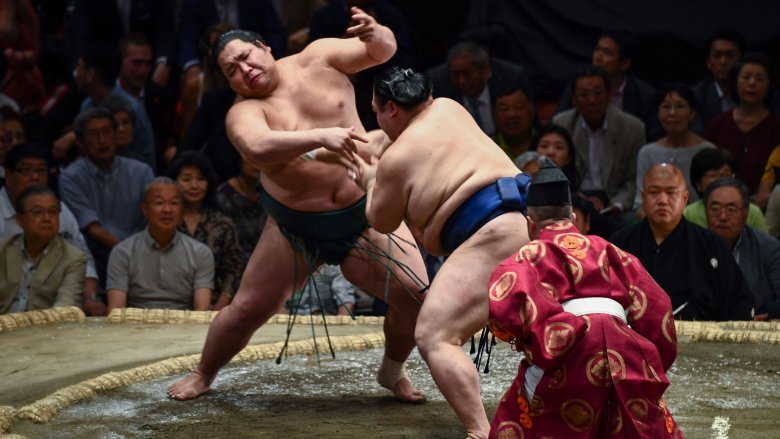Why Women Aren't Allowed In Sumo Rings
Every sport has its share of larger-than-life athletes who seem downright magical, whether it's basketball wizards like Michael Jordan or beloved wrestling goliaths like Andre the Giant. But when it comes to Japan's national pastime, sumo wrestling, the athletes aren't just gigantic magicians; they're borderline ghostbusters. Per the Ancient History Encyclopedia, sumo wrestling may have started during the Yayoi period (300 BCE-300 CE) as a Shinto ritual in which competitors fought spirits. Nowadays, these gargantuan grapplers intentionally make babies cry during an annual ceremony meant to "get rid of demons," according to Atlas Obscura. Because of sumo wrestling's spiritual history, the ring is considered sacred and certain traditions are observed to preserve its sanctity. For instance, wrestlers stomp repeatedly and toss salt into the ring to purify it. They clap their hands "to signify the beginning and end of a prayer." And women are forbidden from entering the ring. Wait, what? If this article were a party, here would be the point where a record scratches, completely ruining the festive mood.
All the ghostbusting and baby weeping sound dandy until you realize they come with a steaming pile of prejudice. As Newsweek describes, women are traditionally deemed "unclean" because they menstruate. In fact, even though women compete in sumo wrestling, they can't do it professionally because of that bloody rule. Officials take this belief so seriously that when Maizuru city mayor Ryozo Tatami collapsed in the middle of a sumo ring while giving a speech in 2018, the female medics that rushed to his aid were ousted by the referee. The women were forced to "supervise the rescue efforts" from outside the ring while male rescuers tended to the mayor.
Understandably, outside observers were horrified by the fact that a baseless fear of crimson cooties outweighed the desire to save a person's life as quickly and efficiently as possible. However, the Japan Times reports that some experts, like anthropology professor Masataka Suzuki, were hesitant to call the prohibition sexist. According to Suzuki, any person who hasn't been "purified" is banned from the ring, meaning "only sumo wrestlers and referees are allowed to enter it." But if that were the issue, then the male paramedics should have been barred from the ring as well, instead of just the women. Ironically, if the mayor had died because qualified females were prevented from helping him, the referee would have had blood on his hands.
